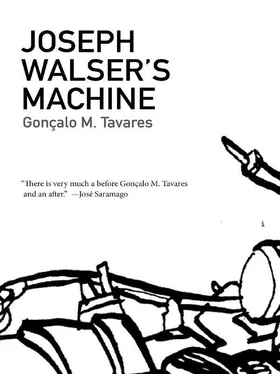He was a strange man, and his wife couldn’t help but laugh as she listened to him. As if humans were “substances that thought,” Joseph Walser had said. Of course humans are substances that think ! Substances with souls, as Margha would put it.
Joseph Walser headed to his room. Margha didn’t even look up.
Walser was a collector. Of what? It’s too early to say. But on this morning he had significantly expanded his collection.
He wore a simple pair of pants, almost like a peasant’s, and his hazel-colored shoes were absolutely out of style.
His wife said: “You’re dressed like you’re from another century. No one thinks that way anymore.”
Joseph Walser doesn’t have his papers on him.
Someone says: “No messing around these days, you always have to have your papers.”
Joseph Walser receives this reprimand in silence.
Distance was proportional to astonishment. When events took place just a few inches or feet away: no big deal, just monotony. Monotony exists in close proximity to mankind, while astonishing things are always out of reach.
The introduction of a single new element into a peaceful environment can effect radical changes in one’s outlook for the day to come. Death had not yet been introduced as an everyday element, but this next month was going to be tough, vile even, according to some forecasts.
“A vile month,” murmured Walser to his wife Margha.
But a month one can’t avoid touching. Relegating all your humiliating fears to the tips of your fingers.
You’ll touch the next month the way you touch the water of a dirty river with your right hand: afterward you have to clean your fingers, you have to wash them.
The technique of influencing men by frightening them about things that don’t exist yet is ancient. It’s happening once again, now. There’s talk of a military unit approaching with great appetite; that’s the word they use: appetite. As if weapons had stomachs, the way organisms do. And a sort of grotesque, metallic saliva. However, mental processes are the only things that have been disturbed, thus far; the physical reality of things still remains calm and well-organized. Factories are keeping up the diligent commotion that corresponds to the routine movements of their peaceful machines, and the necessary products subsequently materialize. In industry, the phenomenon of cause and effect is sustained, and none of the machines interrupt their customary processes to veer off toward such things as miracles or explosions.
“Fortunately, no miracles,” mutters Klober Muller, the foreman at the factory where Joseph Walser works.
As if war were just an excessive concentration of miracles. An irritating series of such occurrences taking place over the shortest possible period of time, a supernatural acceleration, a feat of pure human arrogance, and — more than mere impropriety — a crude domination over time.
There need to be significant pauses in between events. “They shouldn’t just pile up like a heap of shoddy merchandise, events aren’t shoddy merchandise, they’re valuable things,” said Klober.
Joseph Walser was standing next to him, in his hazel-colored shoes, which were absolutely out of style.
Klober couldn’t help but notice.
“Those shoes of yours,’ he said, “are absolutely irresponsible.”
Joseph Walser looked down at his own shoes and then raised his head back up. The smile that he thought of affecting in that fleetingly tense moment disappeared when his eyes took in the expression on Klober’s face. The foreman wasn’t kidding. Not at all: he was annoyed.
“Your shoes are absolutely irresponsible,” repeated Klober Muller.
“No one wears shoes like that anymore.”
How many times had Joseph Walser heard that phrase in the last two weeks? What was going on? He had worn these shoes, or similar ones, for years. No one had ever bothered him about them before. No one had ever before cared about his shoes in the least, neither their color nor shape. Why now?
“I don’t care about your shoes or your ideas, do you understand, my dear Walser? What I told you yesterday isn’t important to me, but it is extremely important to you. Can you see the difference? Can you see the difference that exists between the two of us? Between my shoes and your shoes, between my ideas and your ideas? I’m not interested in your shoes and I’m not interested in your ideas. But you’re interested in my ideas; that’s the difference between us, you see?
“As for your shoes, I’ve already forgotten about them. It’s true that your shoes are absolutely irresponsible, yes, I said it, and I’ll say it again. You might want an explanation, but I won’t give it to you. You should just figure it out. It’s your duty. Mr. Joseph Walser should learn to pick up on things without needing an explanation. There’s an army approaching, and you want explanations about your shoes?
“But I’ll explain what I can to you, Walser. A vile month is coming, as they’ve said on the news, and you, my friend, are wearing dirty, worn-out shoes, you see? You should clean them immediately. We must fight filth with hygiene or we’ll be defeated, don’t you see, dear Walser?
“Order is more important every day. I’m shocked that you still haven’t noticed this.
“Organized insanity is approaching and we’ll have to confront it with calm. No one respects hysteria. War makes insanity look ridiculous. Order, my dear Walser.
“Outright hysteria and a mere untucked shirt should be thought of as belonging to the same universe: the universe of disorder. You can’t confront collective insanity with your shirt untucked — do you get it, Joseph Walser?”
“The machines of war are on their way, but don’t be afraid. The machines approaching the city aren’t the problem: it’s the machines that are already here.
“Multiple generations of machines, their History, Walser: they progress. Just like our ideas. But machines become autonomous, ideas don’t.
“Machines already play a part in the country’s History, as well as our individual biographies. They don’t just have a material or factual trajectory. They also have a History of the spirit, a pathway that has been traced in the world of the invisible, in the world of that which is felt and thought. It is even believed that machines are guiding Man to regions that are closer to Truth.
“And joy, as well, can be reduced to a binary system. To a yes or a no , a 0 or a 1: it exists or doesn’t exist. And this effectiveness, my dear Walser, this fundamental effectiveness, this primary effectiveness, already depends, in large part, upon machines, upon the swiftness with which they transform causes and necessities into beneficial effects. Happiness has already been reduced to a system that machines can comprehend, and in which they can participate and intervene. At this point in time there is no individual happiness that remains independent from technology, Walser, my friend. If you want exact numbers, we can throw some exact numbers around: individual happiness on a given day is, who knows, 70 % dependent on the material effectiveness of machines. The fact that one’s invisible happiness is at the mercy of one’s concrete happiness, a happiness of substances in dialogue with one another, of metal pieces that fit neatly into each other and solve problems by repeating certain tasks, all this may seem strange; but such is the century in which we live.
“Being happy no longer depends on the things that we commonly associate with the word Spirit. It depends on concrete substances. Human happiness is a mechanism.”
Читать дальше












